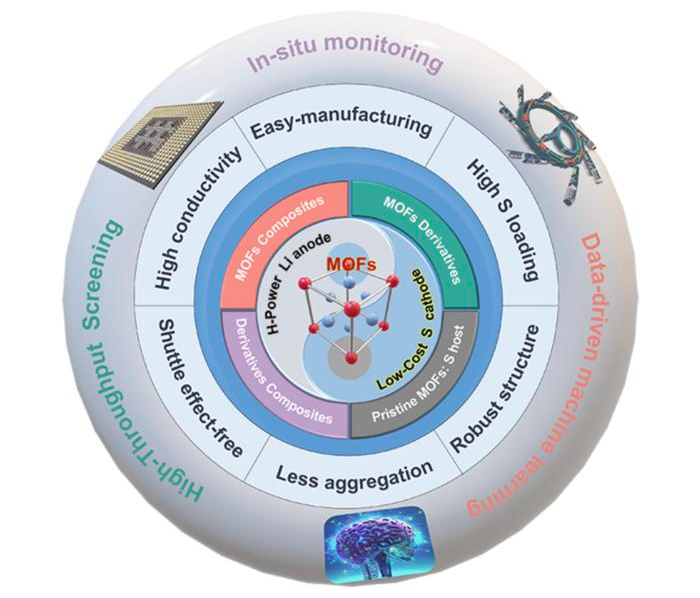Reviewed by Lexie CornerFeb 28 2024
The energy density of the lithium-ion battery technology used today must be increased to fulfill the need for renewable energy. Lithium-sulfur batteries, which have a greater specific capacity and energy density, would theoretically be a competitive substitute. Sulfur presently has drawbacks that prevent widespread practical use.
 This graphic shows the benefits of MOF-based materials and their use in lithium-sulfur batteries, which have many advantages over current lithium-ion technology. Some advantages include easy manufacturing, high conductivity, and a robust structure that all improve the function of the lithium-sulfur batteries. Image Credit: Weihua Chen, Zhengzhou University
This graphic shows the benefits of MOF-based materials and their use in lithium-sulfur batteries, which have many advantages over current lithium-ion technology. Some advantages include easy manufacturing, high conductivity, and a robust structure that all improve the function of the lithium-sulfur batteries. Image Credit: Weihua Chen, Zhengzhou University
On February 8th, 2024, a thorough analysis was published in Nano Research that describes how cathode materials based on metal-organic frameworks might enhance the performance of lithium-sulfur batteries, making them a viable substitute for lithium-ion batteries.
Some major issues still impede the application of high-performance lithium-sulfur batteries, leading to unacceptable practical capacity and cycling stability. First, sulfur’s poor electrical conductivity and those of the discharging products significantly increase some internal resistance of the batteries, limiting the utilization efficiency of the active materials. Also, severe volumetric expansion of sulfur cathodes after the lithiation process causes the structural pulverization of electrodes.
Weihua Chen, Professor, Zhengzhou University
With these drawbacks come performance and safety concerns, so lithium-sulfur batteries are not widely used.
Metal-organic framework-based advanced sulfur cathodes could be the answer. Metal-organic frameworks offer unique characteristics, including high porosity, customizable pore size, and programmable pore shape. They are usually composed of a metal ion or cluster.
Graphene, carbon nanotubes, and certain polymers are conductive materials that can be combined with metal-organic frameworks. Despite their low electrical conductivity and structural stability, pristine metal-organic frameworks have not yet been incorporated into lithium-sulfur batteries.
Chen added, “Because of the porous microstructure, ultra-large accessible specific surface area, and adjustable function group, metal-organic frameworks-based materials have received the attention of investigators as potential cathode hosts for lithium-sulfur batteries and have made significant progress. Particularly, metal-organic frameworks-related materials could effectively restrain the dissolution and diffusion of polysulfide in the electrolytes.”
The pure metal-organic frameworks, various metal-organic framework composites, and metal-organic framework derivatives were all examined in this review of published articles. While the crystalline structure of these intact inorganic metal and organic components indicates that they might be useful in storing active sulfur, most lack the conductivity required for efficient battery operation.
Metal-organic framework composites strengthen structural stability and increase the conductivity of metal-organic frameworks. Carbon nanotubes, graphene, and conductive polymers are feasible alternatives to enhance the shortcomings of pristine metal-organic frameworks. Materials generated from metal-organic frameworks, or metal-organic framework derivatives, offer an additional option.
For instance, carbon materials formed from metal-organic frameworks can help with ion and electron transfers as well as alleviate volume expansion issues in sulfur cathodes, but they also run the risk of compromising the metal-organic framework’s structural integrity. The optimum way to enhance and use these various materials in lithium-sulfur batteries is still being investigated.
Researchers will continue to explore metal-organic frameworks-based materials and how their distinct qualities could enhance the efficiency of lithium-sulfur batteries.
Metal-organic frameworks-related materials are emerging as promising sulfur cathode materials for lithium-sulfur batteries. Despite significant progress in recent years, there still exist challenges to overcome for the commercialization of lithium-sulfur batteries. It will take time and effort to achieve practical application of metal-organic frameworks-related materials in lithium-sulfur batteries, but this review could offer useful guidance for the future development of these materials.
Weihua Chen, Professor, Zhengzhou University
Zhengkun Xie, Boyong Cao, and Ruixue Wang of Zhengzhou University; Xiyan Yue and Jijia Wang of Henan Polytechnic University; Ziqian Xue of Kyoto University; and Guoqing Guan of Hirosaki University are the other contributors.
The National Natural Science Foundation of China, the Key Research and Development Program of Henan Province, the Joint Fund of Scientific and Technological Research, the Development Program of Henan Province, and the Chunhui Plan Cooperative Research Project Foundation of the Ministry of Education of China all contributed to this research.
Journal Reference:
Xie, Z., et. al. (2024) Metal organic frameworks-based cathode materials for advanced Li-S batteries: A comprehensive review. Nano Research. doi:10.1007/s12274-024-6481-0.